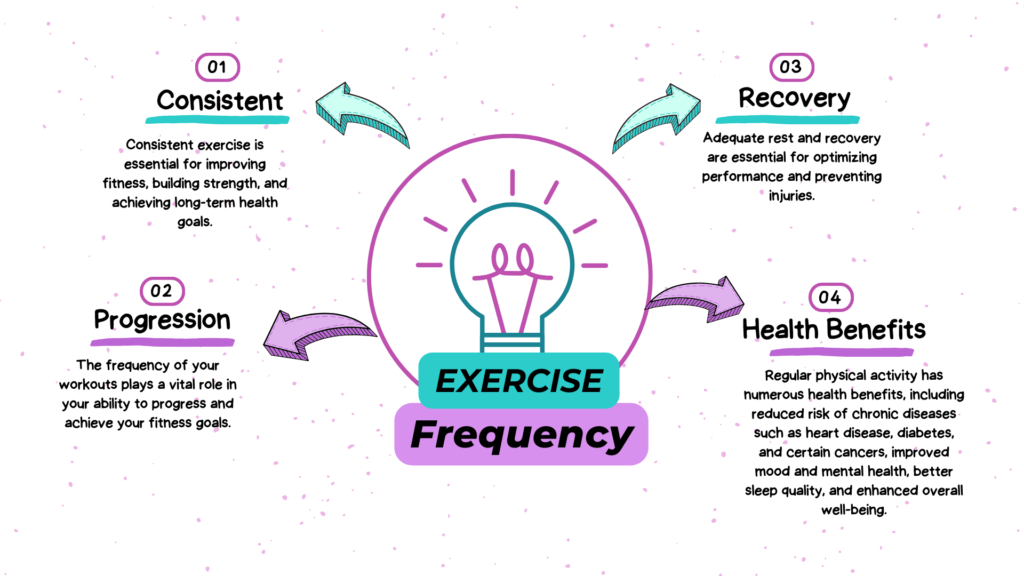Exercise frequency is the number of times you take part in physical activities to enhance your health, fitness, and overall well-being. It is a basic part of any fitness program, as it influences the efficiency of workouts and the results you achieve. However, finding out the correct exercise frequency can be daunting since it relies on different factors like the purpose of your training, your current fitness level, your age, and your lifestyle. In this article, we will get deeper into what exercise frequency means, why it matters and how one can choose their ideal workout schedule.
What is Exercise Frequency?
Frequency of exercises simply refers to how many times in a given period, usually a week, one takes part in some kind of physical activity. It covers different forms of exercise such as running, cycling, swimming, strength training with weights or resistance bands, flexibility exercises like yoga or stretching functional movements like squats, lunges, and push-ups, among others. If you want to get healthy or achieve better outcomes in your overall health, then you should think about the frequency at which you exercise.
The Importance of Exercise Frequency:

Understanding the significance of exercise frequency is essential for ensuring that you get optimal benefits from your fitness routine. Here are some major reasons why exercise frequency is important:
- Consistency: Consistent practice is crucial in enhancing fitness, building strength, and achieving long-term health goals. With a steady workout program, one can form a habit that becomes easier to maintain as time goes by.
- Progression: How many times one works out determines how far they will go in attaining their fitness ambitions. Whatever it may be, losing weight or bodybuilding or improving cardiovascular endurance, regular exercising permits gradual increment in intensity, duration and complexity, which challenges the body so that it reacts appropriately.
- Recovery: One needs enough rest and recovery so as to optimize performance and prevent injuries. Hence, striking a balance between the days when exercises are done and those when they are not enables your body to heal and regenerate muscles, refill depleted stores of energy and adjust itself physiologically to accommodate training demands.
- Health Benefits: Physical activity has several health implications, like decreased likelihood of chronic diseases like heart disease, diabetes and certain cancers, enhancement in mood and mental health, quality sleep and overall well-being. These outcomes are directly related to the number of times one exercises, with more frequent exercise resulting in greater health consequences.
Figuring Out Exercise Frequency
Though there isn’t a single answer to exercise frequency that is right for everyone’s individual needs, several considerations can help one determine what is best for them;
- Fitness Goals: If you have specific fitness goals then your exercise frequency should be aligned with them. For instance, marathon training might necessitate multiple runs per week in order to build endurance, while muscle-building may warrant strength training sessions with enough recovery days.
- Current Fitness Level: Beginners may need fewer weekly workouts initially so as to gradually introduce their bodies into the physical demands of exercising. As fitness increases one can increase the number and intensity of workouts over time.
- Time Availability: Account for your schedule and lifestyle. This will help you to know the exact frequency of exercise that you can commit to. For example, while some people have time for daily work outs, others may be compelled to prioritize shorter, more intense workouts or switch between different types of exercises within a week.
- Listen to Your Body: Watch out for how your body feels after exercising. Should you feel tired, sore or experience pain that lingers on then it could imply that you are not providing enough recovery in terms of adjusting your exercise frequency or intensity
Conclusion:
Exercise frequency is an important aspect of any fitness program—it affects various aspects of your life such as progress during training, your performance as well as health generally. Appreciation of what one is working towards in terms of fitness goals, current fitness levels and personal life would determine the correct number of times one should do exercise each week. Whether you want to enhance cardiovascular health, develop strength or boost general well-being remember consistency and balance are fundamental principles. Pay attention to the messages from the body; make sure it recovers properly so adjust the frequency if needed for optimal results.
